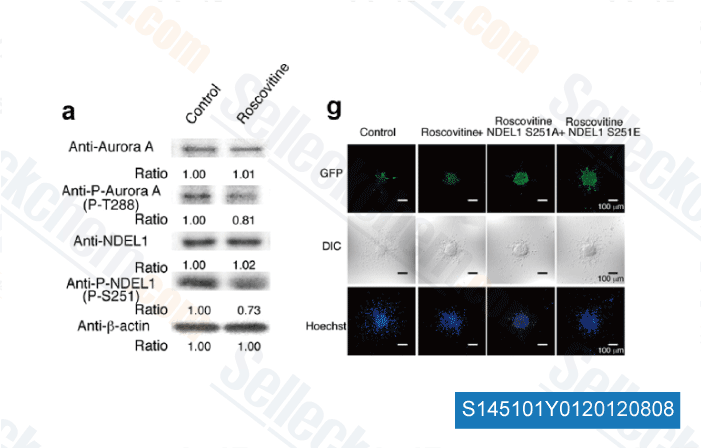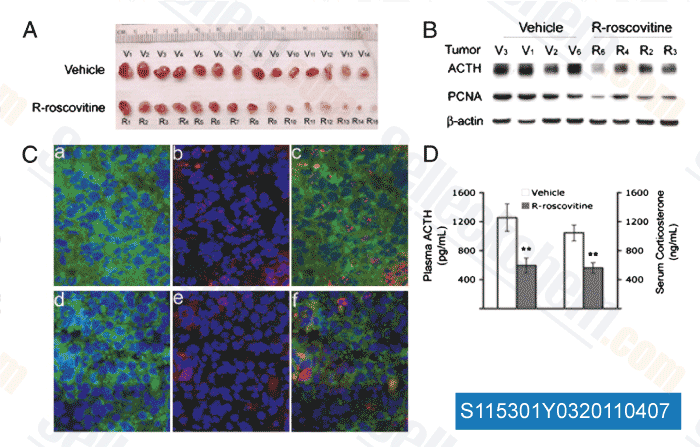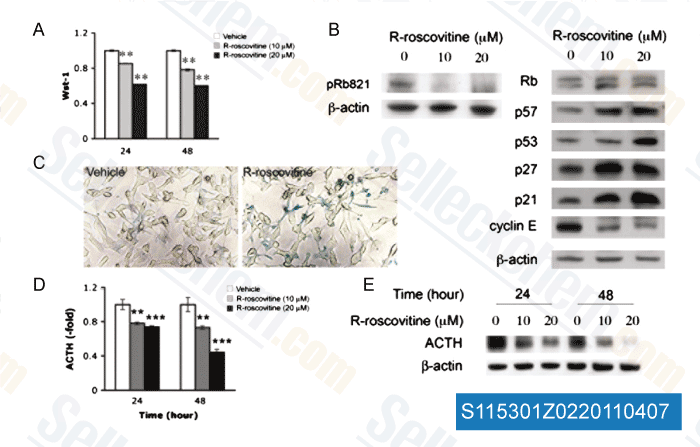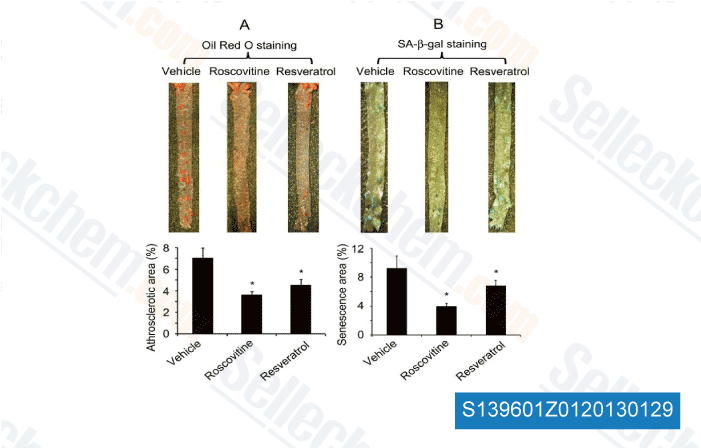|
Toll Free: (877) 796-6397 -- USA and Canada only -- |
Fax: +1-832-582-8590 Orders: +1-832-582-8158 |
Tech Support: +1-832-582-8158 Ext:3 Please provide your Order Number in the email. |
Technical Data
| Formula | C19H26N6O |
|||
| Molecular Weight | 354.45 | CAS No. | 186692-46-6 | |
| Solubility (25°C)* | In vitro | DMSO | 71 mg/mL (200.31 mM) | |
| Ethanol | 31 mg/mL (87.45 mM) | |||
| Water | Insoluble | |||
|
* <1 mg/ml means slightly soluble or insoluble. * Please note that Selleck tests the solubility of all compounds in-house, and the actual solubility may differ slightly from published values. This is normal and is due to slight batch-to-batch variations. * Room temperature shipping (Stability testing shows this product can be shipped without any cooling measures.) |
||||
Preparing Stock Solutions
Biological Activity
| Description | Roscovitine is a potent and selective CDK inhibitor for Cdc2, CDK2 and CDK5 with IC50 of 0.65 μM, 0.7 μM and 0.16 μM in cell-free assays. It shows little effect on CDK4/6. Phase 2. | ||||||||||
|---|---|---|---|---|---|---|---|---|---|---|---|
| Targets |
|
||||||||||
| In vitro | Roscovitine displays high efficiency and high selectivity towards some cyclin-dependent kinases with IC50 of 0.65, 0.7, 0.7 and 0.16 μM for cdc2/cyclin B, cdk2/cyclin A, cdk2/cyclin E and cdk5/p53, respectively. [1] Roscovitine reversibly inhibits the prophaselmetaphase transition in the micromolar range of starfish oocytes and sea urchin embryos, inhibits in vitro M-phase-promoting factor activity and in vitro DNA synthesis in Xenopus egg extracts, and suppresses the proliferation of mammalian cell lines with an average IC50 of 16 μM. [1] In mesangial cells, Roscovitine results in a dose-dependent reduction of CDK2 activity that at concentrations of 7.5, 12.5 and 25 mM, Roscovitine causes a 25, 50% and 100% decrease in CDK2 activity, respectively. [2] A recent study shows that Roscovitine inhibits cdk5 kinase activity, cell proliferation, multicellular development, and cdk5 nuclear translocation in Dictyostelium discoideum, without affecting the expression of cdk5 protein during axenic growth. [3] |
||||||||||
| In vivo | Roscovitine, at a dose of 50 mg/kg, significantly inhibits growth of The Ewing's sarcoma family of tumors (ESFT) xenografts. [4] Roscovitine enhances the antitumor effect of doxorubicin without increased toxicity with a mechanism that involves cell cycle arrest rather than apoptosis in nude mice bearing established MCF7 xenografts. [5] |
Protocol (from reference)
| Kinase Assay: |
|
|---|---|
| Cell Assay: |
|
| Animal Study: |
|
References
Customer Product Validation

-
Data from [J Hematol Oncol, 2012, 7, 53]

-
Data from [PNAS, 2011, 108, 8417]

-
Data from [PNAS, 2011, 108, 8417]

-
, , University of Hong Kong
Selleck's Roscovitine has been cited by 129 publications
| Switch-like phosphorylation of WRN integrates end-resection with RAD51 metabolism at collapsed replication forks [ Nucleic Acids Res, 2024, gkae807] | PubMed: 39315694 |
| An E7-retinoblastoma protein pathway mechanism may account for the higher carcinogenic ability of HPV16 over HPV58 in cervical cancer [ Transl Cancer Res, 2024, 13(4):1876-1886] | PubMed: 38737678 |
| Multiplex single-cell chemical genomics reveals the kinase dependence of the response to targeted therapy [ Cell Genom, 2024, 4(2):100487] | PubMed: 38278156 |
| Cytoplasmic division cycles without the nucleus and mitotic CDK/cyclin complexes [ Cell, 2023, 186(21):4694-4709.e16] | PubMed: 37832525 |
| Cytoplasmic division cycles without the nucleus and mitotic CDK/cyclin complexes [ Cell, 2023, 186(21):4694-4709.e16] | PubMed: 37832525 |
| Polarized microtubule remodeling transforms the morphology of reactive microglia and drives cytokine release [ Nat Commun, 2023, 14(1):6322] | PubMed: 37813836 |
| Polarized microtubule remodeling transforms the morphology of reactive microglia and drives cytokine release [ Nat Commun, 2023, 14(1):6322] | PubMed: 37813836 |
| Development of allosteric and selective CDK2 inhibitors for contraception with negative cooperativity to cyclin binding [ Nat Commun, 2023, 14(1):3213] | PubMed: 37270540 |
| Re-Evaluating the Relevance of the Oxygen-Glucose Deprivation Model in Ischemic Stroke: The Example of Cdk Inhibition [ Int J Mol Sci, 2023, 24(8)7009] | PubMed: 37108171 |
| 27-hydroxycholesterol and DNA damage repair: implication in prostate cancer [ Front Oncol, 2023, 13:1251297] | PubMed: 38188290 |
RETURN POLICY
Selleck Chemical’s Unconditional Return Policy ensures a smooth online shopping experience for our customers. If you are in any way unsatisfied with your purchase, you may return any item(s) within 7 days of receiving it. In the event of product quality issues, either protocol related or product related problems, you may return any item(s) within 365 days from the original purchase date. Please follow the instructions below when returning products.
SHIPPING AND STORAGE
Selleck products are transported at room temperature. If you receive the product at room temperature, please rest assured, the Selleck Quality Inspection Department has conducted experiments to verify that the normal temperature placement of one month will not affect the biological activity of powder products. After collecting, please store the product according to the requirements described in the datasheet. Most Selleck products are stable under the recommended conditions.
NOT FOR HUMAN, VETERINARY DIAGNOSTIC OR THERAPEUTIC USE.
